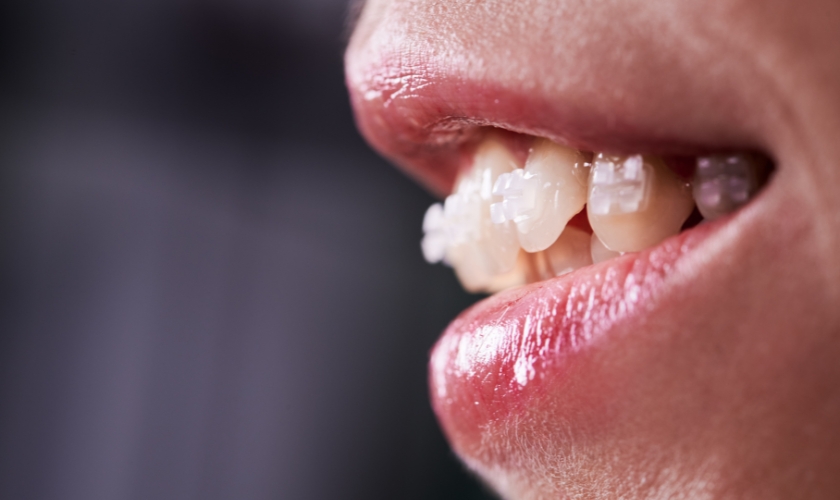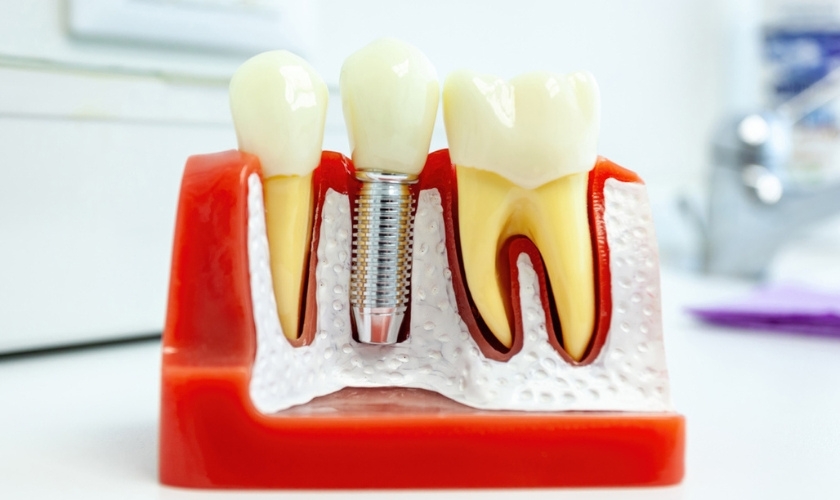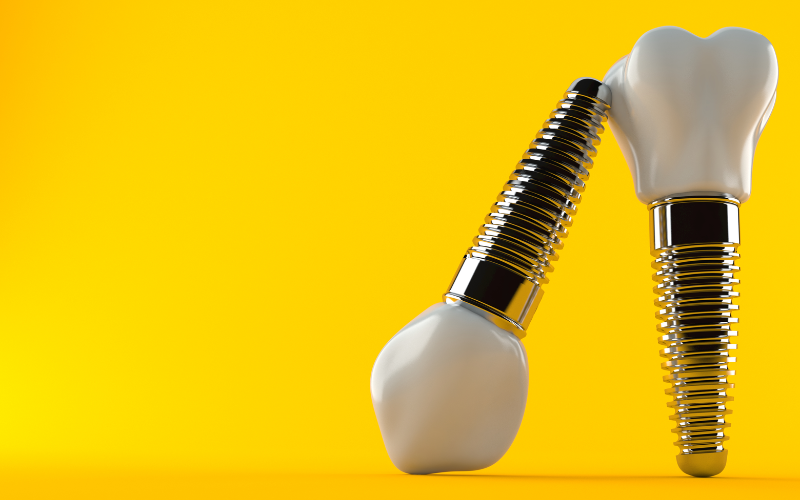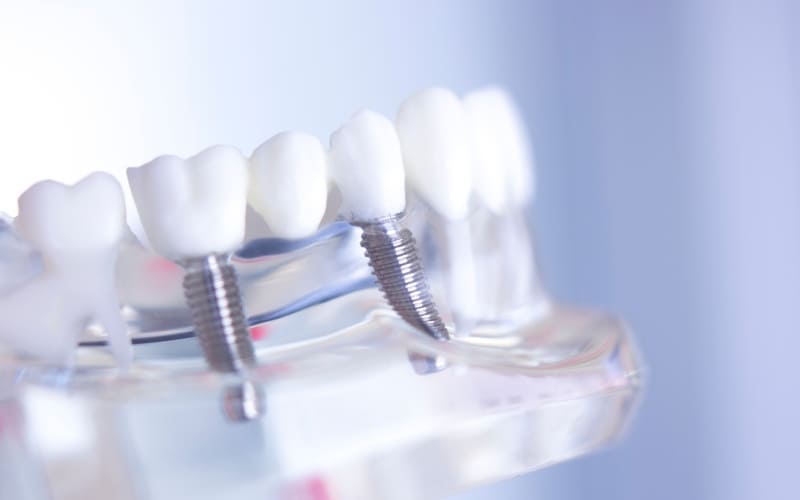1520 Green Oak Place, Suite B Kingwood, Tx 77339
Protecting Your Dental Implants by Managing Bruxism

When it comes to protecting your dental implants, these titanium posts represent a remarkable advancement in modern dentistry. Surgically placed into your jawbone, they serve as artificial tooth roots, offering a stable foundation for crowns, bridges, or dentures. Implants provide numerous benefits by enhancing the aesthetics, functionality, and confidence of your smile. However, like any dental restoration, implants require proper care to ensure their longevity. If you experience bruxism, or teeth grinding and clenching, it’s essential to manage this condition effectively to safeguard your implants and maintain their durability over time.
Understanding Bruxism: The Silent Threat to Your Smile
Bruxism is a condition characterized by involuntary clenching or grinding of teeth. It can occur during the day or night, with nighttime bruxism being more common. While the exact cause of bruxism remains unknown, stress, anxiety, certain medications, and even an abnormal bite can contribute to it.
If left unaddressed, bruxism can lead to various dental problems, including:
- Excessive wear and tear on teeth
- Fractured teeth
- Jaw pain and discomfort
- Headaches
- Temporomandibular joint (TMJ) disorders
The Impact of Bruxism on Dental Implants
Dental implants, while incredibly strong, are not invincible. The constant pressure and friction caused by bruxism can negatively impact implants in several ways:
Implant Loosening:
The continuous force exerted by bruxism can gradually loosen the implant over time, compromising its stability and potentially leading to implant failure.
Bone Loss:
Bruxism can accelerate bone loss around the implant site, jeopardizing its long-term health.
Crown Damage:
The grinding forces can damage the crown (the artificial tooth) attached to the implant, requiring replacement.
Protecting Your Investment: Strategies for Managing Bruxism
When it comes to protecting your dental implants, the good news is that bruxism is a manageable condition. By collaborating with your dentist and employing effective strategies, you can safeguard your dental implants and uphold a healthy, radiant smile.
Custom-Made Nightguards:
Protecting your dental implants is crucial, especially against the effects of bruxism. Acrylic appliances worn at night serve as a barrier between your upper and lower teeth. Nightguards absorb and distribute the forces caused by teeth grinding, safeguarding your implants from damage. A dentist in Kingwood can craft a custom nightguard tailored precisely to your needs, ensuring both comfort and optimal protection for your dental implants.
Stress Management Techniques:
Stress is a significant trigger for bruxism. Incorporating stress-relieving practices like yoga, meditation, deep breathing exercises, or spending time in nature can significantly reduce the frequency and intensity of bruxism episodes.
Physical Therapy:
In some cases, physical therapy can help address muscle tension and imbalances in the jaw joint that contribute to bruxism.
Bite Adjustment:
If an uneven bite is suspected to be a contributing factor, your dentist may recommend bite adjustment procedures to create a more balanced and comfortable bite.
Botox Injections:
In severe cases, botox injections can be used to relax the muscles responsible for clenching and grinding.
Early Detection is Key: Regular Dental Checkups
Regular dental visits are crucial for maintaining good oral health and protecting your dental implants. During your checkups, your dentist will assess the condition of your implants, including any signs of wear, loosening, or bone loss. Additionally, they can check for signs of bruxism, such as excessive tooth wear or jaw tenderness. Early detection and intervention are essential for preventing further damage and ensuring the long-term success of your implants.
Creating a Winning Team: Working with Your Dentist
When it comes to protecting your dental implants and managing bruxism, communication and collaboration with your dentist are key. Discussing your bruxism concerns, symptoms, and any risk factors is crucial. Your dentist will then recommend the most suitable treatment plan based on your individual needs and the severity of your bruxism.
Living a Smile-Worthy Life with Bruxism
Bruxism might sound daunting, but with proper management strategies and regular dental care, you can effectively protect your dental implants and maintain a healthy, functional smile. By taking proactive steps to manage bruxism, you can invest in the long-term success of your implants and enjoy a lifetime of confident smiles.
Additional Tips for a Bruxism-Free Smile
Be mindful of your chewing habits:
Avoid habits like chewing on pencils, nails, or hard candy, as they can contribute to bruxism.
Maintain a healthy diet:
Opt for a balanced diet rich in fruits, vegetables, and whole grains to manage stress levels naturally.
Get enough sleep:
Aim for 7-8 hours of quality sleep each night, as inadequate sleep can exacerbate bruxism.
Living with Bruxism: Beyond the Basics
While the core strategies mentioned earlier form a solid foundation for managing bruxism, there are additional approaches you can explore to further minimize its impact and protect your dental implants.
Biofeedback Therapy:
This technique uses biofeedback equipment to provide real-time feedback on your muscle activity. By learning to recognize and control muscle tension in your jaw, you can consciously relax and reduce bruxism episodes.
Cognitive Behavioral Therapy (CBT):
This form of therapy can help identify and address any underlying psychological factors contributing to bruxism, such as stress or anxiety. Through CBT techniques, you can develop coping mechanisms to manage stress and reduce bruxism episodes.
Acupuncture:
While research on the effectiveness of acupuncture for bruxism is ongoing, some studies suggest it may offer relief by promoting relaxation and reducing muscle tension.
Alternative Relaxation Techniques:
Explore various relaxation techniques like progressive muscle relaxation, guided imagery, or mindfulness meditation to manage stress and promote better sleep, potentially reducing bruxism episodes.
Addressing Underlying Medical Conditions:
Certain medical conditions can contribute to bruxism. Discussing your symptoms with your physician can help identify any underlying issues that might be triggering your bruxism. Treating these conditions can significantly reduce bruxism episodes.
Lifestyle Modifications:
Limit Caffeine and Alcohol:
Excessive caffeine and alcohol consumption can exacerbate bruxism. Consider reducing your intake of these substances, especially before bedtime.
Hydration:
Staying adequately hydrated can help relax muscles and potentially reduce bruxism episodes.
Creating a Sleep-Friendly Environment:
Invest in a Comfortable Pillow:
A supportive pillow that aligns your head and neck properly can promote better sleep posture and reduce muscle tension in your jaw, potentially minimizing bruxism.
Maintain a Cool Bedroom Temperature:
A cool and quiet bedroom environment can contribute to better sleep quality and potentially reduce nighttime bruxism episodes.
Limit Screen Time Before Bed:
Electronic device blue light can interfere with your sleep cycle. Avoid screen time for at least an hour before bedtime to promote relaxation and better sleep.
The effectiveness of any bruxism management strategy depends on consistent application. Whether it’s wearing your nightguard regularly, practicing relaxation techniques daily, or avoiding triggers like caffeine before bed, consistency is crucial for achieving optimal results.
The Importance of a Holistic Approach:
Managing bruxism effectively often requires a multi-faceted approach. Combining professional dental care with stress management techniques, lifestyle modifications, and potentially alternative therapies can provide comprehensive relief and protect your dental implants. Don’t hesitate to discuss various options with your dentist in Kingwood to create a personalized treatment plan that addresses your specific needs and preferences.
Living a Fulfilling Life with Bruxism
Protecting your dental implants involves taking a proactive approach to managing bruxism, ensuring your smile remains healthy and confident for years. By combining good dental care, stress management techniques, and lifestyle adjustments, you can effectively mitigate the impact of bruxism on your implants. Remember, maintaining open communication with your dentist is crucial for continuous monitoring, adjusting treatments as needed, and achieving long-term success. Please consult with your dentist or physician for personalized recommendations regarding bruxism management and dental implant care.
Frequently Asked Questions
Absolutely! Bruxism, the habit of grinding or clenching teeth, can put excessive pressure on dental implants and the surrounding bone. This can lead to implant loosening, fracture, or even implant failure.
Signs of bruxism affecting implants include pain or discomfort around the implant, increased jaw ache or soreness, loose feeling in the implant, and cracks or damage to the implant crown. If you experience any of these symptoms, consult your dentist immediately.
1. Custom-made night guards: These acrylic mouthpieces worn at night cushion your teeth and implants, absorbing the impact of grinding and clenching.
2. Stress management techniques: Since stress is a common trigger for bruxism, practices like yoga, meditation, or deep breathing can help reduce teeth-grinding episodes.
3. Botox injections: In some cases, dentists may recommend Botox injections to relax overactive jaw muscles and reduce grinding.
While no guaranteed home remedies exist, some strategies may help- Applying a warm compress to your jaw muscles can relax them before sleep, potentially reducing nighttime grinding. Caffeine and alcohol can exacerbate bruxism, so limiting intake, especially before bed, might be beneficial. Proper brushing and flossing promote overall oral health and potentially reduce discomfort that might trigger grinding.
Left untreated, bruxism can not only damage dental implants but also lead to worn-down natural teeth, TMJ (temporomandibular joint) disorder, headaches, facial pain, and difficulty in chewing.
Early intervention through a combination of dental treatments, stress management, and possibly lifestyle modifications can significantly protect your dental implants and overall oral health.







